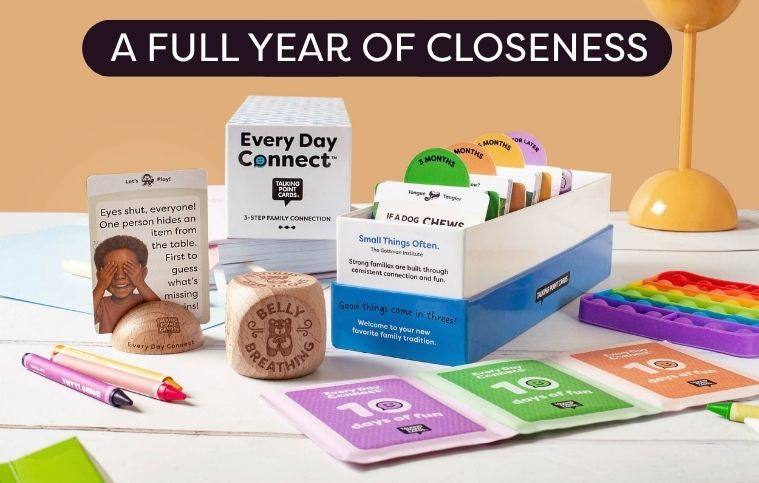SHOP
About
Unsaid No More
Addressing Unspoken Issues in Your Marriage

Hi there, beloved blog readers! Today we're going to dive into one of the great mysteries of the universe: communication in marriage. Because let's be honest, sometimes it feels like our spouses are speaking a completely different language.
We all know good communication is essential for a happy, healthy relationship. But so often, issues go unspoken, words go unsaid, and we're left stewing in our own married misery. Until one day those buried feelings burst forth in a spectacular eruption of resentment, hurt
and incredulous condemnation like:
"You NEVER replace the toilet paper roll!"
"Well YOU leave your gnawed-on toenail clippings all over the house!!"
\*record scratch*\* Wait, what? Where did THAT come from?
Deep breath. We've all been there. Those trivial issues that somehow balloon into monumental bones of contention through the magical dark arts of bottling and festering. But never fear, we're going to unpack all of those unexpressed sentiments, air out the emotional clutter, and give you the tools to confront those pesky unspoken issues before they become full-blown marital meltdowns.
So pull up a chair, grab a notepad (or more realistically, that ever-present smartphone), and get ready to take some notes. Healthy couples conversation ahead!
The Warning Signs of Unspoken Issues

How can you tell if you and your spouse are harboring some unsaid grievances? Well, besides the annual New Year's Day tsunami of repressed angst, there are a few red flags to watch for:
-
The Cone of Silence: You just...stop talking about certain subjects altogether. You both know _that topic_ is landmine territory, so you tiptoe around it with the delicacy of a ninja. Uncomfortable silences abound.
-
A Watched Pot Never Boils: Those niggly little issues seem so insignificant at first, so you don't bring them up. But then they start stacking up like a bunch of unwatched Netflix episodes until one day you've got a full-on binge-watching backlog of resentment.
-
Groundhog Day: The same frustrating situations keep playing out over and over with no resolution. You think "surely this HAS to get better"...but it doesn't. Because you're not actually addressing the root cause!
-
Too Many Jokes: Humor can be a great way to broach sensitive subjects, but when every other sentence is a passive-aggressive "just kidding!", you may have stopped being funny a while ago.
So how do we avoid these pitfalls and foster more open, honest communication as a couple? Let me walk you through some strategies...

Creating a Safe Space for Expressing Yourself
Before we can start untangling those unsaid knots, we need to agree on some ground rules for having difficult conversations. Because let's face it, these talks can easily devolve into raising voices, calling names, and the dreaded Whataboutisms. Not an environment conducive to vulnerability and sharing your deepest emotional truths.
The first step is to sit down with your partner (timing is important - don't initiate during an active conflict) and establish some basic guidelines for difficult discussions:
-
Take turns talking and LISTENING without interrupting
-
No name-calling, insults or character attacks (criticize the behavior, not the person)
-
If things get too heated, agree to take a break and revisit later
-
Come from a place of understanding, not accusation
-
The goal is resolution and growth, not "winning"
Having this conversational code of conduct in place from the outset creates a safe container for you both to open up. It's like a referee's whistle - if things start to get out of hand, either of you can call a time-out, cool off, and restart from a calmer state.
Another key element is adopting an attitude of curiosity over criticism. When your spouse shares a complaint or gripe, instead of getting defensive, ask clarifying questions to better understand their perspective: "I'm sensing you felt disrespected when I did X - is that right? Can you elaborate on that feeling?"
This validates their experience while allowing you to have an open dialog. No one's mind has ever been changed through bitter condemnation - but plenty of growth can happen through empathy and listening to understand.
Remember: the goal isn't to out-logic or defeat your partner's viewpoint, but to explore each other's emotional landscape with compassion. resolving unspoken issues requires teamwork, not warfare.
How to Broach Those Tough Subjects

Okay, so we've created a safe environment for vulnerable sharing. We've set the court for fair play. Now...how do we actually take that scary first step of putting those buried feelings into words?
Well, here are some suggestions for gently guiding those elephants into the open:
The Compliment Sandwich
You start by giving a sincere compliment or expressing appreciation for your spouse. Follow that with the difficult issue you need to discuss, stating it objectively without blame. And then finish with another statement of affirmation and positivity. The idea is to couch the difficult truth between two layers of kindness and goodwill. It's emotional cushioning to soften the blow.
Use "I" Statements
Instead of accusing statements like "You always do X", frame things from your personal experience. "I feel frustrated when X happens because Y." This keeps things centered on your perspective and emotions without sounding like an attack.
Find The Right Time
Timing is crucial when broaching sensitive subjects. Don't ambush your partner when they're swamped with work stress, hangry, or fresh off a difficult interaction. Similarly, avoid bringing up heavy topics right before bedtime or when one of you needs to head out the door. Plan a
time when you can both be physically and mentally present.
The Written Word
If you're really struggling to find the right words in the heat of the moment, consider writing your spouse a letter or email first. This allows you to carefully articulate your thoughts and explain that vulnerable place you're coming from. Your partner can then digest the message
on their own time before responding - everyone wins.
The key in all of these cases is to **avoid aggressive tones or pointed fingers as much as possible**. The goal is to create an environment of openness, empathy and good faith on both sides. No one wants to feel attacked or put on the defensive when revealing their inner emotional world.

Common Unspoken Issues (And How to Tackle Them)
Every marriage (and every couple) will have their own unique set of unspoken burrs under the saddle. However, there are some common themes that tend to come up again and again when digging into those relational weeds:
**Household Chores & Division of Labor
Ah yes, the eternal "You NEVER do the dishes/take out the trash/replace the toilet paper roll" lament. Confusion and disagreement over expected roles and responsibilities can quickly breed resentment if not addressed. The fix? Sit down (in your mutually-established Safe
Conversational Space) and _explicitly_ divide up chores/duties in a way you both feel is fair. Get it in writing or a shared digital checklist if needed. And hold each other accountable in a considerate manner if tasks are overlooked.
Money & Budgeting
Financial stresses and differing attitudes toward spending/saving are another prominent source of relationship land mines. Have a frank discussion about your financial goals and risk tolerances as a couple. Explore any limiting beliefs or hang-ups around money you may have absorbed from childhood. And most importantly: get on the same page about budgeting and investing through open, judgment-free dialog. Looping in a financial advisor can also help couples gain objective insights into this sensitive area.
Physical Intimacy/Sex Life
Unspoken disappointments or inhibitions around intimacy can create deep gulfs between partners. Cultural stigmas and personal vulnerabilities often make this a difficult subject to broach. But that guarded silence simply leaves wounds to fester. Enlist the help of a couples
counselor or sex therapist if needed - these professionals are trained in creating safe, shame-free spaces to explore physical and emotional intimacy.
Resentments & Emotional Grievances
Even in the best marriages, partners will sometimes hurt or disappoint each other in small (and occasionally large) ways. Left unaddressed, these injuries can harden into bitterness and gridlock over time. The remedy? Like all unspoken issues, these relational bruises cannot heal until exposed to air and light. Voice your hurts through the lens of personal feelings ("I felt disrespected when...") vs. accusatory laments ("You ALWAYS disrespect me by..."). And be open to making periodic "repair attempts" where you own up to your side of the conflict with empathy and contrition. Small acknoweldgements of "I hear you, and I'm sorry I hurt you in that way" can go a long way.
Quality Time & Connection
In our frenetic modern world with its deluge of distractions, many couples struggle with deliberately _investing_ in their relationship. You may share a home and bed, but are you truly _connecting_ on a soulful level? Setting aside intentional quality time - screen-free, focused presence - is crucial for reigniting that spark. As is engaging in new activities and adventures together that foster freshness and wonder. Don't let your marriage slip into an unconscious, unspoken rut.
Differing Life Goals/Visions
Our desired paths and priorities can shift across a lifetime as we mature and our circumstances change. The footloose ambitions of our 20s may not align with the family-focused realities of our 30s or our re-inventive strivings in mid-life. Failed to reality-check and re-align your visions as a couple, and you can veer dangerously off-course into resentment. Regularly opening up about your evolving hopes and dreams - again, free from judgment - can keep you co-piloting in the same direction.
Personal Qualities & Shortcomings
We all have quirks, blindspots, and growth areas - some lovable, some...not so much. Chances are, there are aspects of your partner's personality that low-key get under your skin (and vice versa). Letting those pet peeves go unvoiced often leads to simmering animosity.
The healthier approach? Voice the tensions around those personal qualities _directly yet delicately_. "When you do X, I feel Y" without lashing into character attacks. Showing patience and a willingness to evolve can defuse many conflicts.
No matter the specific issue, the core solution remains the same: drag that sucker into the sweet sunlight of open discussion. Unearth it, expose it to fresh air, and cooperatively get to work on remedying it through conscious effort and good faith.
The alternative - indefinite bottling and festering - is far more toxic in the long run. As the old adage wisely states: "You can't heal what you can't feel." So start feeling those longstanding frustrations and tending to your relational wounds, one revelatory conversation at a time.

A Few Final Tips for Flourishing Conversation
Before I set you lovebirds loose to start flapping those unspoken jaws, a few final pointers on nurturing authentic conversation as a couple:
Make Agreements Explicit
Don't leave important understandings around duties, boundaries, or future plans in the Land of Implication. Get actual verbal/written confirmation of being on the same page.
Check In Regularly
Having quarterly/annual "relationship review" chats to air grievances or update on shifting priorities. Don't let those underground fires burn for years untended.
Seek Outside Perspective
Whether through counseling or just chatting with other trusted friends/mentors, getting an third-party view is invaluable. We all have blindspots in our closest relationships.
Dig Into Emotional Origins
When uncovering conflict patterns, be curious about the deeper emotional "why" driving you or your partner's stances. Increased empathy and self-awareness win the day.
Celebrate Small Victories
Having a major soul-baring conversation is tough - so reward yourselves afterwards with something pleasurable you both enjoy! That satisfying rush will reinforce the positive feelings.
Above all, be tenacious and keep at those meaningful conversations. Like any transformative work, it's an ongoing practice of vigilance and course-correction over time.
But the rewards of hoisting those veiled elephants into the light? A vastly deepened couple's connection and the blissful shedding of decades worth of interpersonal baggage.
So keep talkin' it out, lovebirds! And enjoy the path of ever-increasing intimacy, acceptance and fulfillment with your chosen life partner.
LIKED THIS ARTICLE?
SIGN UP FOR MORE!







